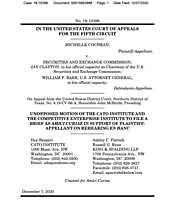Learn more about Cato’s Amicus Briefs Program.
In 2016, an in‐house judge at the SEC made an initial determination that Michelle Cochran violated federal accounting regulations. But before the SEC could finalize its order against Ms. Cochran, the Supreme Court ruled in Lucia v. SEC that the agency’s in‐house judges are “inferior officers” subject to the Appointments Clause. Because SEC judges had not been appointed by the “President alone…Courts of Law, or…Heads of Departments”—as required by Article II—the Supreme Court invalidated all ongoing administrative enforcement proceedings before the SEC, including the one against Ms. Cochran.
After Lucia, the SEC attempted to cure this constitutional defect by “ratifying” its administrative law judges’ prior appointments. But the SEC’s “solution” resulted in another constitutional problem—regarding the removal of officers. In Free Enterprise Fund v. PCOB, the Supreme Court held that “officers” of the United States may not be insulated from presidential control by more than one layer of tenure protection. Yet the SEC’s judges enjoy employment protections, and they are removable by SEC commissioners, who also enjoy employment protections. That is, the SEC’s administrative law judges are “officers” with at least two layers of tenure protections and, therefore, run afoul of the Supreme Court’s reading of the president’s removal authority, as set forth in Free Enterprise Fund.
Enough is enough. With the help of the New Civil Liberties Alliance, Ms. Cochran filed suit against the SEC in a federal district court in Texas, arguing that she should not have to undergo a second unconstitutional enforcement proceeding. After the district court dismissed her case, Ms. Cochran appealed to the Fifth Circuit, and her case is now before the en banc (full) court.
Building on our prior participation in this and related cases, the Cato Institute, joined by the Competitive Enterprise Institute, today filed a brief in support of Ms. Cochran. We urge the Fifth Circuit to open the doors of the federal judiciary to Ms. Cochran and similarly situated parties, who otherwise lack recourse for the constitutional injuries they’ve suffered.

This work is licensed under a Creative Commons Attribution-NonCommercial-ShareAlike 4.0 International License.
